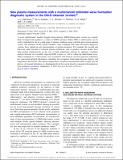New plasma measurements with a multichannel millimeter-wave fluctuation diagnostic system in the DIII-D tokamak
Author(s)
Hillesheim, J. C.; Peebles, W. A.; Rhodes, T. L.; Schmitz, L.; White, Anne E.
DownloadWhite_New Plasma.pdf (497.1Kb)
PUBLISHER_POLICY
Publisher Policy
Article is made available in accordance with the publisher's policy and may be subject to US copyright law. Please refer to the publisher's site for terms of use.
Terms of use
Metadata
Show full item recordAbstract
A novel multichannel, tunable Doppler backscattering (DBS)/reflectometry system has recently been developed and applied to a variety of DIII-D plasmas. Either DBS or reflectometry can be easily configured for use in a wide range of plasma conditions using a flexible quasi-optical antenna system. The multiple closely spaced channels, when combined with other fluctuation diagnostic systems, have opened up new measurements of plasma properties. For example, the toroidal and fine-scale radial structure of coherent plasma oscillations, such as geodesic acoustic modes, have been probed simultaneously in the core of high temperature plasmas by applying correlation analysis between two toroidally separated DBS systems, as well as within the multichannel array. When configured as a reflectometer, cross-correlation with electron cyclotron emission radiometry has uncovered detailed information regarding the crossphase relationship between density and temperature fluctuations. The density-temperature crossphase measurement yields insight into the physics of tokamak turbulence at a fundamental level that can be directly compared with predictions from nonlinear gyrokinetic simulations.
Date issued
2010-10Department
Massachusetts Institute of Technology. Department of Nuclear Science and EngineeringJournal
Review of Scientific Instruments
Citation
Hillesheim, J. C. et al. “New plasma measurements with a multichannel millimeter-wave fluctuation diagnostic system in the DIII-D tokamak (invited).” Review of Scientific Instruments 81 (2010): 10D907. © 2010 American Institute of Physics
Version: Final published version
ISSN
0034-6748